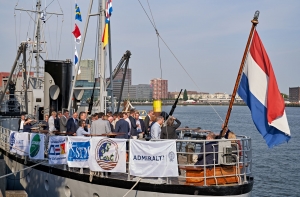


(Posted on 31/05/18)
The Port of Rotterdam, has hosted an international group discussion on standardised data definitions for the worldwide exchange of nautical information. There was a higher turnout than expected with the industry’s leading international players attending. Standardisation of shipping information is crucial to making more efficient use of sea-going vessels and reducing emissions.
In recent years, the international Port Call Optimisation Taskforce has considerably advanced the introduction of international standards for nautical information. The Taskforce combines the forces of international companies, sea ports and organisations. This year the functional definitions - unambiguous names covering matters such as depth and estimated time of arrival - established last year will be published in the Mariners Handbook of the United Kingdom Hydrographic Office - an official reference book that is kept on the bridge of every vessel. The next step is to set out data definitions for the transmission of information. This was given the green light during a workshop held in the Port of Rotterdam at the initiative of the International Port Call Optimisation Taskforce, Sea Traffic Management (STM), European Harbour Master Committee, United Kingdom Hydrographic Office and GS1.
Standardisation of nautical information is needed to make more efficient use of sea-going vessels and reduce emissions. “In recent decades numerous parties, including STM, have been working on the issue of nautical information exchange,” stated Per Setterberg, Operational Project Manager on the STM Validation Project. “We need to prevent them becoming parallel projects. During the workshop in Rotterdam, we demonstrated that we can work together, that we are willing to learn from one another and that we are able to adopt each other’s standards.” Ben van Scherpenzeel, Chair of the Port Call Optimisation Taskforce, said: “The time had come to align all of the initiatives. Sea-going vessels need to be able to communicate with each other and with the ports and cargo must be able to communicate with the supply chain. As a Taskforce, we do not expect there to be a global solution to this issue; however, it is important that all systems concerned are able to ‘talk’ to one another. It is for this reason that we have been concentrating on standardisation from the outset. We are proud that initiatives such as SMART (Korea) and SESAME (Norway and Singapore) have been adopted.”
Representatives of these organisations discussed specific examples of data definitions based on industrial standards. The workshop was also attended by nautical navigation system and terminal system suppliers. Participants from the Taskforce, including Maersk and Shell, also attended. “Although we are not all from the same sector, we are mutually dependent on one another,” explained Frans Caspers of Shell. “Without standardisation, we will continue buffering and suffering. Switching from single scheduling to collaborative scheduling puts us in a better position to manage the margins and buffers. All of this requires transparency; a platform on which to share information and standardisation.” Andreas van der Wurff of Maersk Line continues: “The Taskforce is working on optimisation. It is great that all parties concerned with shipping are involved in this. As a company, you cannot go it alone. Shipping companies will benefit from the fact that ports and service providers are also engaged in the shipping industry.”
With more than sixty people, the turnout was better than expected. Van Scherpenzeel: “A sign that Port Call Optimisation is on the worldwide agenda. Shipping is a global business. It is therefore important that we strive towards global standards and ensure that they are able to work from port to port. In the ports, it is important to get everyone who provides a service to the ocean-going vessel on board. Our first goal is to exchange the most basic standardised information. If a terminal is expecting a vessel at a given location at a certain time, matters such as time and position need to be communicated unambiguously. In doing so, we shall gradually make progress.”
With this year’s Rail Conference “Rail Freight Transport and Seaports”, a joint initiative... Read more
Asian Bulk Logistics (ABL Group) and ICG have jointly announced the successful completion of ABL&rsquo... Read more
Abu Dhabi based AD Ports Group, a leading global enabler of integrated trade, industry and logistics... Read more
The Executive Board of Hamburger Hafen und Logistik AG (HHLA) has appointed Patrick Krawutschke as Managing... Read more
Abu Dhabi based AD Ports Group, a global enabler of integrated trade, transport, industry, and logistics... Read more
This year marks a significant milestone in maritime innovation as Port Hedland, Australia, celebrates... Read more
Associated British Ports (ABP), the UK’s leading port operator, has announced the latest tranche... Read more
During the Investment, Labour, and Trade Promotion Programme in Japan (November 16–22, 2025),... Read more
AD Ports Group subsidiary Khalifa Economic Zones Abu Dhabi - KEZAD Group, the largest operator of integrated... Read more
Abu Dhabi based AD Ports Group, a global enabler of integrated trade, transport, industry, and logistics... Read more